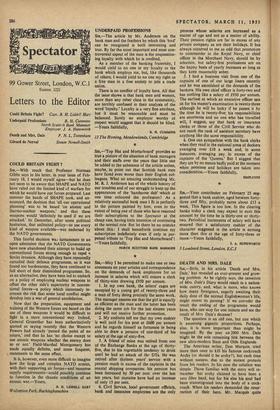Letters to the Editor
Could Britain Fight? Capt. B. H. Liddell Hart Underpaid Professions B. H. Cummini
North Scottish Bank Mancteer Employer, J. A. Hunsworth
Death and Mrs. Dale P. N. L. Tottenham Gerard de Nerval Simon Nowell-Smith
COULD BRITAIN FIGHT?
SIR.—With much that Professor Norman Gibbs says in his letter. in your issue of Feb- ruary 18, I would myself agree—but he does not seem to be aware that SHAPE and NATO have ruled out the limited kind of warfare for which he would have our forces prepared. Last summer the heads of SHAPE took, and an- nounced, the decision that 'all our operational planning' was to be based 'on atomic and thermo-nuclear weapons,' and that these weapons would 'definitely be used if we are attacked.' In December, after some political hesitation, that unlimited policy—to use every kind of weapon available—was endorsed by the NATO governments.
This fateful decision wa3 tantamount to an open admission that the NATO Governments have now abandoned their attempt to build up conventional forces strong enough to repel a Soviet invasion. Although they have repeatedly curtailed their defence programme, as it was found too burdensome, they have continued to fall short of their diminished programme. So, as an alternative, they have been led to embark on a policy of employing nuclear weapons to offset the other side's superiority in conven- tional forces—a policy which immensely in- creases the risk that some local conflict might develop into a war of general annihilation.
Now that the preparation, equipment and training of the Western forces are based on the use of these weapons it would be difficult to fight in a more conventional way. Indeed, General Gruenther has been authoritatively quoted as saying recently that the Western Powers had already 'passed the point of no return,' and that he has 'no choice except to use atomic weapons whether the enemy does so or not.' Field-Marshal Montgomery has made equally definite, and more frequent, statements to the same effect.
B. H. LIDDELL HART










































 Previous page
Previous page